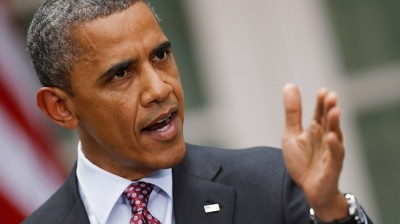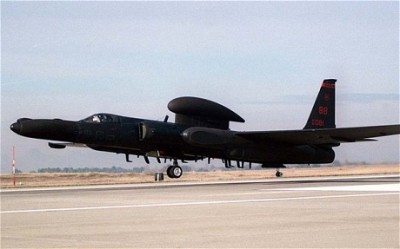 U.S. President Barack Obama has authorized reconnaissance flights over Syria as ISIS militants continue to gain ground in the war-ravaged nation, a U.S. official told CNN.
U.S. President Barack Obama has authorized reconnaissance flights over Syria as ISIS militants continue to gain ground in the war-ravaged nation, a U.S. official told CNN.
The flights — seen as a forerunner of possible U.S. airstrikes against ISIS in Syria — could begin at any point, the official said Monday.
“In general, when you’re thinking about conducting operations like that, you certainly want to get as much of a view on the ground as you can,” Pentagon spokesman Rear Adm. John Kirby said earlier Monday in a conversation with CNN’s Wolf Blitzer.
“Satellites can provide you good visibility, but you always want closer eyes on target if you can,” Kirby said, before Obama’s decision was made public.
Concerns have been intensifying over the threat posed by ISIS after the extremist group posted a video last week showing the beheading of captive American journalist James Foley.
The United States has already been gathering intelligence on the locations of ISIS leadership and troops in Syria, two U.S. officials told CNN on Friday.
U.S. reconnaissance assets are likely to be looking for a variety of sites including “equipment parks, training centers, encampments, the sorts of facilities and buildings where ISIS perhaps has its governing facilities,” said retired Col. Peter Mansoor, an ex-aide to former CIA Director Gen. David Petraeus.
The U.S. military began carrying out airstrikes against ISIS positions in Iraq this month, helping Kurdish and Iraqi forces halt the Islamic extremists’ murderous advance. It has also sent military advisers to Iraq.
‘A nonexistent border’
But the area under ISIS’ control straddles the Iraq-Syria border.
“Can they be defeated without addressing that part of their organization which resides in Syria? The answer is no,” Gen. Martin Dempsey, the chairman of the Joint Chiefs of Staff, said last week. “That will have to be addressed on both sides of what is essentially at this point a nonexistent border.”
It remains unclear to what extent Dempsey, Obama’s top military adviser, supports immediate U.S. action on the Syrian side of the frontier. He has advocated going after ISIS in Syria when it presents a direct threat to the U.S. homeland.
But both he and Defense Secretary Chuck Hagel left open the possibility of strikes against ISIS in Syria in comments last week.
And the White House didn’t rule the option out on Monday.
“While the President has not made a decision to take additional military actions at this time, we don’t restrict our options by geographic boundaries when it comes to the central mission of protecting our people,” said U.S. National Security Council spokeswoman Caitlin Hayden.
Col. Edward Thomas, a spokesman for Dempsey, confirmed that the general “is preparing options to address ISIS both in Iraq and Syria with a variety of military tools including airstrikes.”
But the lack of action so far is prompting criticism from those who want more to be done, like the hawkish Republican Senator Lindsey Graham.
“The White House is trying to minimize the threat we face in order to justify not changing a failed strategy,” he said Monday.

Warning from Syrian regime
Any U.S. military action in Syria would have to contend with the complexities of the vicious conflict that has torn the Middle Eastern country apart over the past several years. The civil war has killed more than 191,000 people, according to U.N. estimates.
Last year, the Obama administration tried to build support for military action against the regime of Syrian President Bashar al-Assad, which it accused of using chemical weapons against opposition forces and civilians.
But Obama ultimately held back from the politically unpopular move after Russia proposed a plan to dispose of Syria’s chemical weapons.
Now, the potential target of U.S. airstrikes is ISIS, which has been fighting al-Assad’s forces in Syria. On Sunday, the militants seized control of a key air base in the northern province of Raqqa.
Syrian Foreign Minister Walid Moallem said that al-Assad’s regime was ready to accept support from the United States and others working under the U.N. umbrella to fight “terrorists” — a reference to ISIS.
Moallem warned against any unilateral action or strikes in Syrian territory without permission.
“Any effort to fight terrorism should be done in coordination with Syrian government,” Moallem said.
U.S. not planning to work with al-Assad
When asked to what extent the United States would need to work with the Syrian government to strike ISIS, Kirby said, “Not getting into the hypothetical operations, there’s no intention to coordinate with Syrian authorities.”
U.S. officials have on many occasions demanded that al-Assad step down.
In a discussion about whether the United States military would need Syrian government approval to act against ISIS in Syria, White House Press Secretary Josh Earnest referenced the assassination of Osama bin Laden in Pakistan in May 2011.
“The President has already demonstrated a willingness, where necessary, to protect the American people, has demonstrated a willingness to use military force to protect the American people, regardless of borders,” Earnest said Monday.
The White House said last week that Obama would consult with Congress before taking action in Syria. The President also would seek to forge a coalition including regional allies as well as U.N. and European Union support, officials have made clear.
‘The lesser of two evils’
But attacking ISIS could have some undesired side effects in the region for the United States, said CNN National Security Analyst Peter Bergen.
“If you intervene, you may be helping Iran and Hezbollah and (al-Assad’s) regime,” he said.
“This is the very definition of choosing between the lesser of two evils,” said CNN White House Correspondent Jim Acosta.
Airstrikes would be effective in blocking the momentum of armed forces on the offensive, Mansoor said.
“It doesn’t take too many people around you getting blown up to make you not want to get out into the open,” he told CNN.
But U.S. officials have said that a lasting solution to the chaos in Iraq and Syria requires a broader approach.
“Secretary Hagel and Chairman Dempsey both said last week that the military solution is not going to be enough,” Kirby said, mentioning the need for diplomatic, political and economic measures.
“The real answer long term is stable governance in Syria and in Iraq to address the needs of people,” he said.
CNN

Leave a Reply
You must be logged in to post a comment.